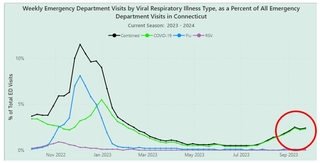Masking strategically, maintaining a low threshold to test for COVID, taking a thoughtful approach to gatherings, and getting vaccinated are the tools that will help us keep the impact of respiratory viral infections to a minimum.
COVID Vaccine Update
COVID vaccines are finally arriving at Yale! Below is an overview of the new vaccine, followed by details on how to schedule.
The U.S. now has a newly formulated COVID vaccine based on the XBB.1.5 variant. On September 12, the Advisory Committee on Immunization Practices (ACIP) made specific recommendations on who should be vaccinated, and the Centers for Disease Control and Prevention (CDC) approved those recommendations.
Who should get the new vaccine?
ACIP and the CDC recommend that all individuals 6 months and older be vaccinated. The recommendations are strongest for those at increased risk of severe COVID disease: those 65 and over, those with weakened immune systems, and those with significant underlying conditions. That said, the ACIP analysis indicated that benefits of vaccination exceed risks in all groups.
- Everyone 5 years and older may receive a single dose of the updated vaccine to be up to date with COVID vaccine recommendations.
- Those with a weakened immune system and children aged 6 months through 4 years require more doses to protect against serious illness. Details are available on the CDC website.
What you need to know
- The new vaccine, while not matching current variants exactly, has been shown in humans to stimulate a strong antibody response against the current variants and is expected to provide improved coverage over the prior bivalent vaccine.
- Improved protection against infection is expected to be relatively short-lived, on the order of 2-4 months, as has been seen with previous vaccines. Protection against severe disease and hospitalization is expected to be more durable.
- Data continues to show that vaccination reduces the risk of developing long COVID.
- The side effects observed to date are comparable to those seen with prior mRNA vaccines. Myocarditis, an increasingly rare complication of vaccination seen more often in young men, continues to be observed more commonly following COVID infection than following vaccination.
Vaccine timing matters
- The new vaccine should be given at least 8 weeks after any previous COVID vaccine.
- Most people can wait at least 3 months after COVID-19 infection to receive the vaccine, as infection boosts the immune response and reduces reinfection risk. Some may wish to be vaccinated sooner than 3 months, including:
- People with increased risk of severe disease.
- People who share a household with someone at increased risk.
- Those planning travel or higher risk gatherings.
What about the Novavax vaccine?
The Novavax COVID vaccine has also been updated and shown to be comparable to the mRNA vaccines in effectiveness. It has now been approved by the Food and Drug Administration (FDA). The Novavax vaccine may be an option for:
- Individuals who did not tolerate the mRNA vaccines or chose not to get them.
- Those who prefer a mix-and-match approach (“heterologous”) of different vaccine types, which has been recommended by some experts.
COVID Vaccines at Yale
Vaccines are available through the Yale Vaccine Program for faculty, staff, students, and Yale Health members and can be booked through our Flu COVID Finder scheduling tool.
- We expect initial demand will be high, so please be patient as appointments may fill quickly. We will add additional clinics as supplies come in. Check our website for updates.
- The vaccine brand we offer (Pfizer or Moderna) will depend on availability. The FDA and the CDC consider the mRNA vaccines interchangeable for adults. If you previously received a vaccine from one manufacturer, receiving a vaccine now from the other manufacturer is safe and may even boost protection. Note: Children aged 6 months through 4 years should receive all doses from the same manufacturer.
Insured by Yale Health?
Yale Health members may now seek COVID vaccines at external pharmacies if they choose. You will need to print your Yale Health member ID card and bring it to the pharmacy to qualify for coverage. See our website for details.
- Flu and other vaccines, including RSV, must be received at Yale Health.
- The Novavax vaccine will be offered through our Immunization department when supplies are available.
Insured by Aetna?
Employees with Aetna insurance are eligible for vaccination through the Yale Vaccine Program or through the Aetna network.
- Dependents of Aetna members or employees who are unable to take advantage of the Yale Vaccine Program are encouraged to visit a local in-network pharmacy or schedule an appointment with their primary care provider.
- To find a participating pharmacy, please visit the Aetna website and click “Find a Pharmacy” on the homepage in the “Find Care & Pricing” section.
Other insurance?
If you are a Yale employee or student, you may be vaccinated through the Yale Vaccine Program. Check your own insurance for other options you may have in your network.
I hope everyone will take this opportunity to get your flu and COVID vaccines.
Be well,
Madeline S. Wilson, MD, FACP
Chief Campus Health Officer
